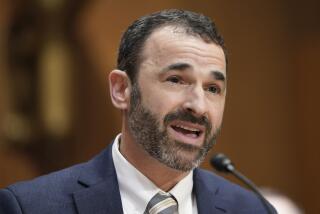BONUS BACKLASH RIPS INTO WALL ST.
- Share via
NEW YORK AND WASHINGTON — As Washington’s anti-bonus zeal intensified Friday, alarm spread across Wall Street that the government’s sudden taxation fervor could ensnare thousands of workers and affect every major financial firm.
Although the fast-moving legislative campaign was born of frustration with the bonuses paid to workers at ailing American International Group Inc., employees at comparatively healthy investment banks fretted about the steep tax hikes they could face if the legislation became law.
A bill passed Thursday by the House would impose a 90% levy on bonuses paid to workers whose household incomes top $250,000 by firms that received more than $5 billion under the government’s financial rescue package. That would encompass much of Wall Street, including such marquee-name firms as JPMorgan Chase & Co. and Goldman Sachs Group Inc.
And new proposals sprouted Friday on Capitol Hill as some lawmakers said the measure passed the day before didn’t go far enough.
Rep. Brad Sherman (D-Sherman Oaks) said he was preparing legislation that would impose a 70% surtax on all pay -- not just bonuses -- above $500,000 a year at major companies that received bailout funds.
And a prominent labor union official wrote congressional leaders asking for legislation to recoup $3.6 billion in bonuses paid by Merrill Lynch & Co., most of which wouldn’t be taxed under the House-passed bill because nearly all of the payouts were made last year.
On Wall Street, where outsized pay is a significant attraction, staffers worried that Congress could rewire a compensation system that dates back decades, to the days when the firms were private partnerships and bonuses served as a form of profit-sharing.
The rush to taxation only heightened the anxiety of an industry enduring its most arduous period in decades.
For the firms in comparatively good shape, most employees thought they had survived the worst of the financial crisis, said Jeanne Branthover, head of the financial-services practice at Boyden Global Executive Search in New York.
“Yes, they may be earning less and be working harder, but they were OK,” she said. “And now, anything could happen. People in New York at every firm are worried.”
Top executives -- fearing an exodus of talent to smaller firms, hedge funds or foreign banks that wouldn’t be subject to the tax legislation -- scrambled Friday to calm employees and lobby Congress.
Jes Staley, head of JPMorgan’s asset-management division, told the unit’s staff in an e-mail that the company’s executives and government-relations team were “working hard on all of the challenges we are currently facing.”
In a memo to the staff at Citigroup Inc., Chief Executive Vikram Pandit wrote, “I want you to know that we are working in every appropriate way . . . to ensure that we can pay our employees fairly, reflecting their market value and hard work, especially during these challenging times.”
A special tax on the industry’s employees, Pandit wrote, “would affect countless numbers of people who will find it difficult, if not impossible, to pay back the bonuses that they earned.”
The outlook for enactment of the House legislation was not clear at week’s end. Leading members of the Senate Finance Committee were proposing a much lower tax -- 35% -- on bonuses.
The chairwoman of labor federation Change to Win, Anna Burger, wrote to lawmakers of both parties late Friday, thanking the House for its measure and calling for swift action to block the Merrill Lynch bonuses.
“I applaud this effort to recover these hard-earned taxes from funding another vacation home for financial buccaneers responsible for displacing millions from home and job,” she wrote. “Without an amendment, however, a 2008 bonus booty 20 times greater than at AIG will remain safe.”
Sherman said his proposal would include the bonuses at Merrill Lynch, which became part of Bank of America Corp. on Jan. 1.
Scott Talbott of the Financial Services Roundtable, a trade organization, cautioned in an interview that broad legislation limiting compensation “could have a chilling effect on participation in future and current government recovery efforts.”
Asked about bonuses for executives of firms that accept government aid, he said such firms “should incur those expenses that will add value to the company and the government’s investment therein. For executives, all forms of compensation have been slashed as they are committed to restoring the economy.”
--
tom.hamburger@latimes.com
More to Read
Inside the business of entertainment
The Wide Shot brings you news, analysis and insights on everything from streaming wars to production — and what it all means for the future.
You may occasionally receive promotional content from the Los Angeles Times.










